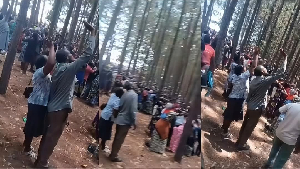This blog is managed by the content creator and not GhanaWeb, its affiliates, or employees. Advertising on this blog requires a minimum of GH₵50 a week. Contact the blog owner with any queries.
DjQwequ Blog of Wednesday, 24 September 2025
Source: Emmanuel Jacob Amissah

A prophecy predicting that the biblical Rapture would occur on September 23–24, 2025, sparked widespread attention in South Africa and beyond, with reports of some church members gathering in anticipation of the event.
The prophecy was linked to Joshua Mhlakela, a South African man who claimed he received visions from Jesus, instructing him that He would return on those dates to take His church. Mhlakela tied his revelation to Rosh Hashanah, the Jewish New Year, which coincided with the same weekend.
The message quickly went viral online, especially under the hashtag #RaptureTok, with hundreds of thousands of posts appearing on TikTok and other platforms. Many people reportedly made preparations for the prophecy, with some quitting jobs or selling belongings, while others mocked the claim or dismissed it as yet another failed doomsday prediction.
Although online speculation suggested that congregants had gathered outside to await the Rapture, there was no verifiable evidence of large-scale assemblies in South Africa. Most of the frenzy was centered on social media, with individuals expressing either excitement or skepticism.
Christian leaders and theologians widely cautioned believers, stressing that the Bible itself warns against setting specific dates for Christ’s return. They pointed out that similar end-time predictions throughout history have repeatedly failed.
As September 23 passed without incident, reactions shifted. Some online expressed disappointment, while others criticized the prophecy or turned it into memes. Analysts noted that the viral spread of the claim was fueled largely by social media dynamics and humanity’s recurring fascination with apocalyptic themes.


